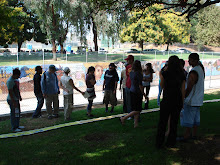Do all history teachers hate Wikipedia? In truth, hate is probably too strong a word. After all, Wikipedia has many useful features, and even I, a card carrying Wikipedia hating history teacher, have used it upon occasion. But if we don’t all hate it, then why do so many of us stipulate that our students do not use Wikipedia as a research source?
Problem One: Wikipedia has no official editor or fact checker, so the site is known to contains mistakes and content biases. I run across mistakes all the time. Once, while I was preparing a curriculum for the film Spirit Bear: The Simon Jackson Story, Wikipedia linked me to a biography about a different Simon Jackson. If I hadn’t been checking all my sources, I would have made a seriously foolish mistake. As for biases, the site even has a page where readers may question any article’s neutrality, along with a backlog of articles yet to be processed and a request for volunteer help. As a researcher, I’ve learned how to find facts within biases, but how many high school students take the time to read the discussion behind the discussion?
Problem Two: The site does not really feature primary source material. If you look up Spirit Bear in Wikipedia, you will find this entry. If you Google past Wikipedia, you will suddenly you find this site, which contains Simon Jackson’s story told in his own words. Look up Apollo 13 on Wikipedia and you will find this entry. Search a little further on the web, and you will stumble on this official e-book about the Apollo missions posted by NASA Headquarters. It includes a first hand five-page account of what happened aboard Apollo 13 written by one of the three men who lived it, James A. Lovell. Take a look at the difference between the Wikipedia entry and the five-page account written by Lovell, and you tell me which is the more interesting and accurate account. You tell me why a history teacher might actually want a student to search past Wikipedia.
Problem Three: The writing on Wikipedia is largely atrocious, causing many an editor to cringe in terror. It is full of passive construction, vague subjects, and run on sentences. People add information by adding facts to existing ideas; so most sentences end up constructed something like this:
Apollo 13 was intended to be the third manned lunar-landing mission, part of Project Apollo under NASA in the United States, that would look more closely into the surface of the moon.
A good editor might take the time to write this:
“NASA intended Apollo 13 to be Project Apollo’s third manned lunar-landing and designed its systems to examine the lunar surface up close.”
I know this edit may seem silly to many people, but how will kids ever learn to write clear and effective sentences if they are constantly exposed to unclear and wordy writing?
Problem Four: Wikipedia is too easy. In our instant access online world, information is one click away. When kids use search engines to do historical research, nine times out of ten Wikipedia is the first link offered to them. Moreover, I don’t blame them for clicking on the Wikipedia link because they have come to depend on it. They know that most of the other links presented to them lead to an endless number of commercial sites offering links to another endless number of commercial sites.
So what is a student of history to do?
Google has a free online search feature for its AdSense members that has solved the problem for my students. I was able to formate a specialized search engine that weeds out all sites based upon my preferences. I designed my new search engine so it will only access educational, miliatry, governmental, and a few hand picked organizational sites. In other words, the search engine only looks for URLs with edu, mil, int., and gov, designations. When I tried my new search engine, I was thrilled with the outcome. I immediately found dozens of excellent sites that that would have been buried by other search engines. In fact, I found the wonderful online e-book by NASA on my specialized search engine within the first page of listings. My students and I have said goodbye to the overly commercialized misinformation super highway and finally said hello to a search engine that quickly meets both our scholastic needs.
The Google AdSense account is free. You just need to have a blog or website where you can insert the HTML codes to access your new search engine.
If you are a member of Historybusters, you can access the search engine I’ve just described through your members center. Give it a try the next time your kids have to do online research, and discover how much more fun the informational super highway is without all the commercial traffic.
Saturday, April 11, 2009
Subscribe to:
Posts (Atom)




